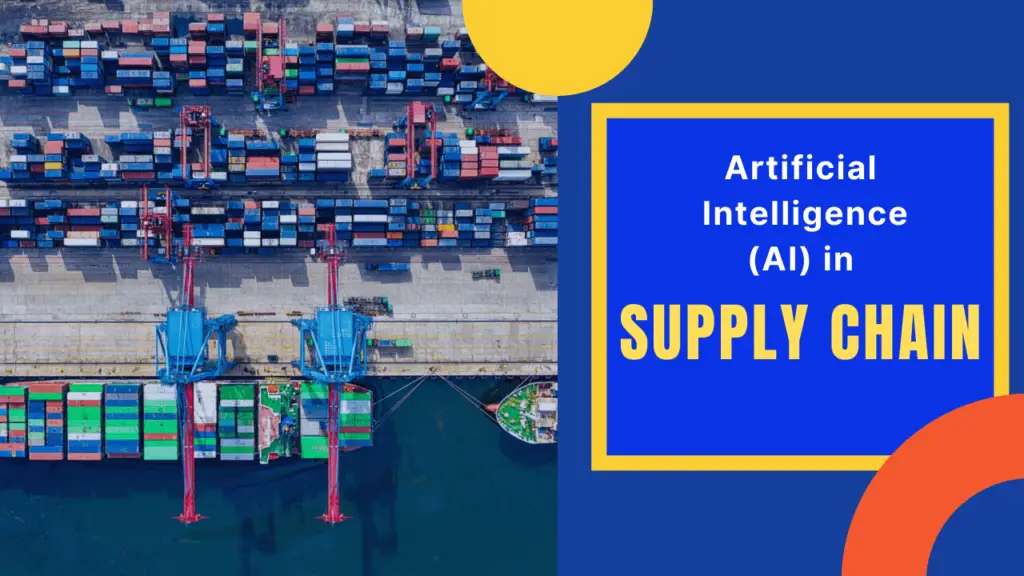The global supply chain incorporates different people, processes, technologies, and organizations. With the global pandemic wreaking havoc on the global supply chains, there is a pressing need for organizations to balance resiliency with profitability. Artificial intelligence in the supply chain helps to improve productivity and quality.
Luckily, technological advancements in today’s world have enabled organizations to manage their supply chains effectively without any need for additional expertise or labor. AI has transformed the supply chain in several ways from decision support to decision automation. Enterprise applications that are based on AI and machine learning drive innovative strategies of the business. These technologies are a game-changer in the supply chain and logistics industry.

Why is AI adoption taking off in the supply chain?
One reason why AI holds importance in the supply chain is the realization by companies of the remarkable potential of AI to solve the complexities associated with operating a logistics network. AI when implemented correctly assists companies to anticipate problems and make smart decisions. AI-enabled proactive systems have raised the quality of service and exceeded customer expectations for undamaged deliveries. AI is further increasing efficiency via automated compliance processing. It has resulted in reduced costs and fewer problems across the logistics network. The amazing thing about AI is its unlimited potential. When combined with technologies like the Internet of Things (IoT) and machine learning, the algorithms become powerful. Access to big data gives companies a good picture of their logistics networks.
Benefits of AI in Supply Chain
There are many benefits of AI in the supply chain. Here we will discuss Top 7 benefits of AI in the supply chain:
1. Predictive capabilities help demand forecasting
Company experiences loss when inventory lags demand. AI ramps efficiencies in predictive demand, enabling merchandisers to be more proactive. After knowing what to expect, they may adjust the number of vehicles and direct them where there is maximum demand. This results in reduced operational costs.
2. Chatbots redefine customer support
Bots can easily handle customer engagements. AI personalizes the relationship between customers and logistics providers. DHL’s partnership with Amazon is an excellent example of a personalized customer experience. After activating the DHL Parcel skill through the Alexa app, DHL consumers may ask Alexa to connect with Amazon Echo and confirm the status of their parcel. If any issue arises during the interaction, Echo users may contact DHL directly for help from its customer support representatives.
Chatbots can be used to:
- Place a purchasing request.
- Speak to suppliers during the interaction.
- Research and answer questions concerning procurement functionalities.
- Receiving invoices and payments.
- Send actions to suppliers related to governance and compliance materials.
3. Smart warehouses are efficient
The smart warehouse is an automated facility wherein work is done via automation. Tedious tasks get simplified in the process, and operations become cost-effective. Alibaba and Amazon, for instance, have transformed their warehouses via automation. Amazon rolled out machines that automate the task of boxing customer orders. Robots work along with humans in Amazon warehouses to increase efficiency.
4. Genetic algorithms improve delivery times and reduce costs
Every minute matters in the logistics business. Companies employ a route planner based on genetic algorithms for mapping out routes for deliveries. Intelligence in logistics has become a central focus within supply chain management. Rapid and accurate shipping lowers lead times and transport costs. It even reduces labor expenses and widens the gap between competitors.
UPS uses a GPS tool ‘Orion’ which assists drivers to make deliveries on time. Routes can be optimized according to traffic conditions and some other factors. Orion helped UPS annually save $50m.
In the future, if autonomous vehicles get developed to the potential hypothesized by tech gurus, there would be an astronomical impact on logistics optimization.
5. Natural Language Processing (NLP) builds data robustness
Natural Language Processing is an integral element of machine learning which has the potential for deciphering huge volumes of foreign language data smoothly. NLP can help build data sets regarding suppliers as well as decipher untapped information because of the language barrier. From a CSR perspective, NLP can streamline auditing as well as compliance actions previously unable due to language barriers between buyer-supplier bodies.
6. Predictive Analysis and Machine learning are used for Supplier Relationship Management (SRM)
Supplier selection and sourcing from the correct suppliers is a critical concern for boosting supply chain sustainability, supply chain ethics as well as CSR. Risks related to the supplier are the ball and chain for prominent brands globally. Data sets produced from SRM actions like supplier assessments, audits, and credit scoring provide a good foundation for decisions regarding the supplier. This gathering of passive data can be made active by intelligible algorithms and machine learning. Supplier selection would be more intelligible than before, making a platform for success from the initial collaborations. All this information will be available for human inspections but produced via machine-to-machine automation, providing different supplier scenarios based on whatever parameters the consumer desires.
7. Machine Learning can be used for Supply Chain Planning (SCP)
Supply chain planning is a critical element within supply chain management strategy. It is important in today’s world to have intelligent work tools that help build concrete plans. Machine learning when applied within supply chain planning can help to forecast within inventory, demand, and supply. Machine learning if accurately applied via supply chain management work tools, can transform the optimization of decision-making in the supply chain. Machine learning technology enables supply chain management professionals to give the best scenarios based on the analysis of big data sets and smart algorithms. It can optimize the delivery of products while simultaneously balancing supply and demand, and doesn’t require human analysis, but only action setting for success.
Bottom-line:
Several companies are posting achievements from their AI investments, and specifically within supply chains. For instance, Rolls Royce employs AI algorithms on its ships for sensing what’s around them in the water and for classifying items based on the threat they pose to the ship. Lineage Logistics is another good example that employs an AI algorithm for forecasting the time when food orders arrive and leave the warehouse. It is expected to see more successful projects in the future as more companies utilize AI in the supply chain.


